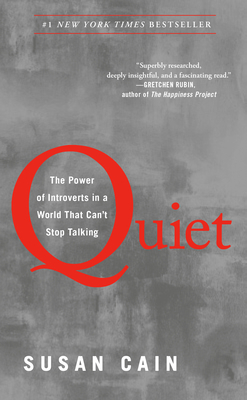At one time in my life, I read many self-help books. I've read other books which deal with behavior and psychology, but this one made enough insights to me for me to consider it a self-help book, and I mean that in a positive way.
Part One introduces the personality traits which cluster into the opposite poles of introvert and extrovert and how the modern United States has adopted "The Extrovert Ideal." Young adult broadcast media protagonists are rock stars (Hannah Montana), spoiled scions (Suite Life of Zack and Cody) and teen detectives (Veronica Mars). Business leaders are portrayed as having boundless energy and charismatic personalities. Politicians are "deciders." Introverts are potential Unabombers. "If you don't toot your own horn, nobody will" is almost a truism.
And our institutions reflect that. We brainstorm, even though research shows it doesn't work. Our schools incorporate group activities and presentations as vital processes. Businesses choose open space work areas which eliminate privacy and encourage "collaboration." Blowhards like Donald Trump run for president.
Part Two of the books presents evidence for the biological origin of these personality traits. As a pseudo-Marxist, I typically reject these kinds of explanation for purely ideological reasons, but even I was able to understand the studies Cain presented which supported biological influence (not determinism). I've also read some books on neuroscience and behavior recently, so I'm going quietly (ha!) to stop insisting that the means of production determine all behavior.
Part Three is an examination of "Asian culture" as an example of a society which idealizes the introvert. Again, my psuedo-Marxist and anti-Orientalism ideological commitments resisted this section, but it was engaging reading and, if relying on some stereotypes to get to the idea that the Extrovert Ideal is a historical phenomenon is necessary, so be it.
Part Four is dense with suggestions and observations that nearly all readers can use to improve their relationships and careers and is the most valuable section of the book. In this section, the author introduces Free Trait Theory, according to which "we are born and culturally endowed with certain personality traits--introversion, for example--but we can and do act out of character in the service of 'core personal projects.'" (p 209) Introverts can adopt the traits of extroverts when necessary, but if they have to do it for something they don't care about it, they will burn out. I was also fascinated by the Self-Monitoring Scale, which measures the extent to which a person, whether introvert or extrovert, can adopt his/her behavior to the social demands of a situation. (p 212)
The author described a married couple, one introvert and the other an extrovert, whose communication styles were causing a cycle of recrimination which was damaging their relationship. By better understanding their respective personality traits, they learned to interpret their partner's words and deeds through the partner's lens and come to a compromise which prevented further damage to the relationship.
Another chapter deals with introverts and extroverts in business, and, I daresay, the lessons might apply to our religious organizations as well.
Educators and parents/guardians can benefit a great deal from the chapter on quiet children in schools. One observation that struck me for its profundity was our fascination with "late bloomers," people whose poor performance in school preceded success as adults. For some reason, despite the frequency of "late bloomers," we always assume the person changed, not that the institution of the school was flawed in some manner and prevented the student from thriving. It is especially important for extrovert parents whose child is an introvert.
Besides "Asians," the author never discusses the race or ethnicity of the people she discusses in the book or how the studies she cites deal with race and ethnicity, despite their importance in other psychological studies. For example, she mentioned that the blush response is useful because it tells others you are sincere.
@susancain re blush response as trust-building. What about dark-skinned ppl whose blushing isn't apparent? Is that cause 4 harsher judgment?
— Ayman Hossam Fadel (@aymanfadel) June 24, 2015
I'd be curious if there is any research into how the personality traits of introrversion and extroversion interact with race and ethnicity in the United States. Is a black female extrovert at the office "pushy" and "militant?" Is a black male introvert, at sentencing in the courtroom, "sullen" and "unrepentant"? Is a black male extrovert in the same situation "glib" and "without remorse"? If introverts are concerned with how people will judge them, what happens when members of non-model minorities are performing before authority figures, most of whom will be members of the dominant ethnic group?And, even though the final season of Dexter may have spoiled this song, it still inspires me!

